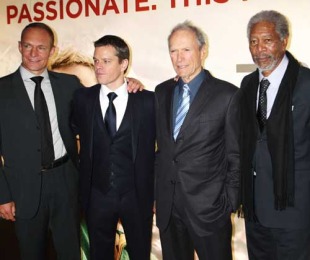|
Invictus
A Hollywood ending
Huw Baines
February 3, 2010

Francois Pienaar is joined by Invictus' big three, Matt Damon, Clint Eastwood and Morgan Freeman
© Getty Images
Enlarge
South Africa's redemptive charge to the 1995 Rugby World Cup crown remains, 15 years on, one of the most thrilling against-the-odds stories in sport , with the Ellis Park finale etched into the memory of rugby fans worldwide. The appearance of Nelson Mandela in the once-hated Springbok jersey, to present skipper Francois Pienaar with the trophy, brought a divided country closer together following the fall of the abhorrent Apartheid regime and is now an iconic image of hope. Journalist John Carlin documented the social, political and sporting impact of the victory in his excellent book Playing the Enemy, now the basis for a cinematic re-imagining of events, Invictus. Directed by Clint Eastwood and starring Morgan Freeman as Mandela and Matt Damon as Pienaar, the film is a worthy and measured view of an undeniably 'Hollywood' event. Having taken on such a daunting task, the respected 'big three' of Eastwood, Damon and Freeman wrestle with the myriad complexities that made the tournament such a unique event. The interaction between the two leads is never less than riveting, with their personal battles given time to breathe by Eastwood. Regardless of faults elsewhere in the film Freeman, and in particular Damon, are fantastic value throughout. Pienaar was immensely moved by the film, as were many critics, but admitted that the film's rugby scenes lacked the intensity of its political exchanges. "They could have done it better," he told ESPNscrum. "Some of the scenes were good. Having played the game you are always going to be critical. I love sports movies, it had to be portrayed through the eyes of the Americans, and they know NFL. The whole focus was to make the movie understandable in America." The rugby scenes are highly stylised and sensibly free of any complexities, meaning that any fans hoping to re-live the late Ruben Kruger's try against France in the rain-lashed semi-final will struggle to get their fix. This fact was not lost on Pienaar, wearing black in honour of Kruger, who died of cancer last week aged 39, at the film's opening night in London. "I'm wearing a black tie for Ruben," he said. "We lost an unbelievable rugby player and a great man. He scored the try against France, if he didn't score that try we might not have won the World Cup." Eastwood's devotion to the story arc means that many of the film's sub-plots, including the actual winning of the World Cup, are marginalised. The director, Damon, Freeman et al have bigger fish to fry, and rightly so. Kiwi observers will no doubt cry foul that there is no mention of Suzie the waitress, but a more significant omission is that of inspirational Springbok coach Kitch Christie. As it is, the mantra of keeping it simple allows only a couple of well-practised Pienaar speeches to carry the players to victory in front of some poorly-rendered CGI fans at Ellis Park. While Invictus will be cast as a 'rugby film', and barely a scene passes without mention of the game, it is absolutely not a 'film about rugby'. The World Cup takes a backseat to the work of Mandela, building towards the Ellis Park finale not on the field but in a number of carefully constructed scenes, including a township training session, which show the changing views of South Africans to the national side and gently introduces the basics of the game to a US audience. The feeling that the real thing had so much more drama, grit and redemptive quality is hard to escape. The Invictus Springboks remain faceless as the filmmakers invest in their fascinating lead duo. They are given little screen time and therefore little chance to make an impression as they head into their final battle against the All Blacks. So free is the film of typical Hollywood glitz that its climactic rugby scenes are left in the shade by barnstorming American Football efforts Friday Night Lights and Any Given Sunday. Also, the path of the brilliant New Zealand side to the final is dealt with in a handful of scenes, while one of the stories of the tournament, Jonah Lomu's emergence, is barely given brain space. There is no sense of the task awaiting the Boks on the field, no trepidation, and therefore their fight never reaches the peaks of other genre films. Still, any grievances over the staging of the final are removed by Damon's note-perfect "We didn't have the support of 63,000 South Africans today, we had the support of 42 million South Africans." A pure Hollywood moment, straight from Pienaar himself. © Scrum.com Huw Baines is the Assistant Editor of ESPNscrum.
|
Live Sports
Communication error please reload the page.
-
Football
-
Cricket
-
Rugby
-
- Days
- Hrs
- Mins
- Secs
F1 - Abu Dhabi GP
Abu Dhabi Grand Prix December 11-131. Max Verstappen ()
2. Valtteri Bottas (Mercedes)
3. Lewis Hamilton (Mercedes)
4. Alexander Albon ()
5. Lando Norris ()
6. Carlos Sainz Jr ()
-
ESPNOtherLive >>
Golf - Houston Open
Snooker - China Open
Tennis - Miami Open

